30 Incredible Benefits Of Coconut And Its Nutritional Value
Discover the transformative benefits of making this natural oil a part of your daily life.
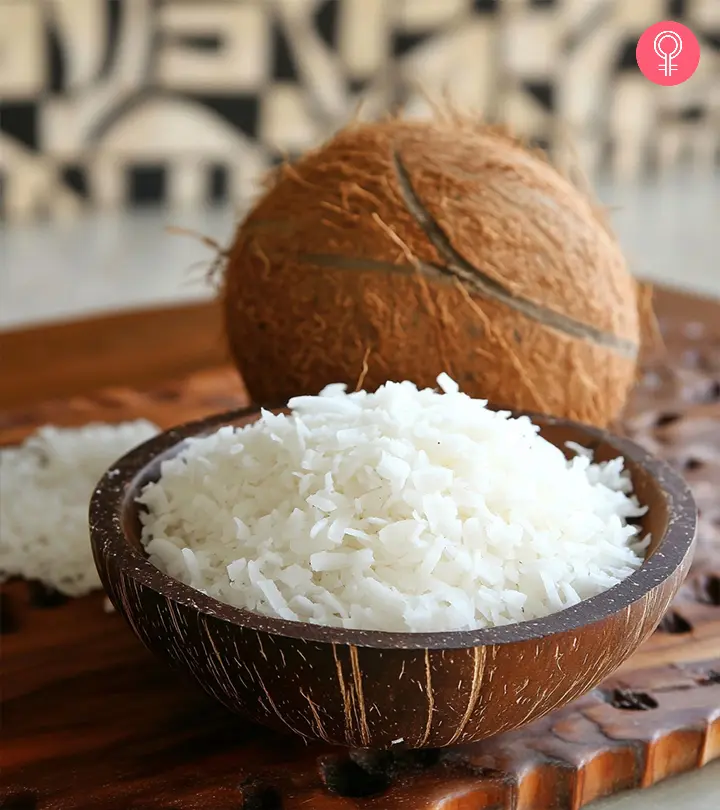
Image: Midjourney/ StyleCraze Design Team
Coconut benefits us in many significant ways, other than just adding its rich creamy flavor to your dishes! Beyond its delicious culinary contributions, coconut has long been celebrated worldwide for its healing properties. Coconut’s benefits stretch far beyond the kitchen, cementing its status as a go-to superfood for health-conscious individuals globally. Whether it’s coconut water, coconut oil, coconut shells in handicrafts, or the coconut husk, each part of this divine fruit has its own benefits to offer! Coconut is one such fruit that not only helps enrich your diet with essential nutrients, but also works for your skin, hair, and overall beauty and health! Just the practice of oiling your hair or rinsing your mouth every day is enough to boost your mental and physical health! Read on to know more about coconut benefits and how you can make the most of this super fruit!
 Know Your Ingredient: Coconut
Know Your Ingredient: CoconutWhat Is It?
It is a tropical fruit with a hard brown hairy outer shell and tender white edible flesh.
What are Its Benefits?
It may improve skin hydration, reduce inflammation, improve heart health, reduce the risk of chronic diseases, and boost the immune system.
Who Can Use It?
It can be used by most people for cooking, skin and hair care, and other health remedies.
How Often?
400 gms of coconut pieces or 2-3 glasses of coconut water is recommended.
Caution
Consuming large amounts of coconut or coconut products may cause gastrointestinal discomfort and allergic reactions with symptoms like rashes and breathing issues.
In This Article
About Coconut
Coconut is a fruit which belongs to the Cocos nucifera palm. This mature nut is one of the most used ingredients in the kitchens of India. Hundreds of coconut species are found all over India and its taste varies according to its soil alkalinity. Its outer part is green in color which turns brown as it matures. Underneath the hard shell is the white edible meat. Coconut is also known as ‘Nariyal’ in Hindi, ‘Kobbari Bondam’ in Telugu, ‘Tenkay’ in Tamil, ‘Thenga’ in Malayalam, ‘Thengina Kai’ in Kannada, and ‘Narikelera’ in Bengali. Wondering how to eat coconut? The freshly harvested coconut contains sweet water which is extremely beneficial for health. Coconut is a healthy nut that can be used safely as a food. It is mainly reaction free. The kernel is not only healthy but is also safe to be eaten during pregnancy.
Key Takeaways
- The high fiber content in coconut lowers the glucose release rate and aids in its conversion to energy.
- The antimicrobial properties of coconut oil increase immunity.
- Anti-cancer properties of coconut oil make it effective in the treatment of breast and colon cancer.
- Electrolytes in coconut water provide hydration and replace lost electrolytes.
30 Amazing Coconut Benefits
Given below are 30 amazing benefits of coconut for skin, hair and health:
Health Benefits Of Coconut
Coconut contains a high amount of saturated fats but these are harmless. They contain Medium Chain Triglycerides which are fatty acids of medium length. These fatty acids are absorbed differently by the body. They go straight to the liver from the digestive tract and are further turned into ketone bodies. This can have therapeutic effects on brain disorders like epilepsy and Alzheimer’s. A study published in Chinese Herbal Medicine found that long-term consumption of virgin coconut oil (VCO) may harm memory. Researchers fed mice different amounts of VCO for 28 days and tested their learning and memory skills. Mice that consumed more VCO struggled with spatial memory and object recognition tasks. When scientists examined their brains, they found damage in the hippocampus, a key area for memory. These findings suggest that while VCO is often considered healthy, excessive intake for a long term might negatively affect brain function (1). Coconut health benefits include the following:
1. Fiber Content
Coconut is high in dietary fiber. According to USDA data 2018, 100g of raw coconut meat contains 9g of dietary fiber (2). Research suggests that fiber slows down the release of glucose and transports it to the cell where it is converted into energy. It assists in relieving stress on the pancreas and enzyme systems, which reduces the risk of developing diabetes (3).
2. Controls Diabetes

Coconut products improve insulin secretion and utilization of blood glucose. It controls diabetes by positively affecting the hormones for blood sugar control. This slows down the rise in blood sugar levels and helps to reduce glycemic cravings (4). Animal studies show that coconut also aids quick digestion. A study published in International Journal of Obesity (London) examined how coconut oil affects weight, body composition, and irisin levels in overweight individuals. Researchers divided participants into two groups: one followed a weight-loss diet with coconut oil, while the other followed the diet without it. Surprisingly, coconut oil did not impact weight loss or body fat percentage. However, it significantly lowered irisin levels, a hormone linked to metabolism and energy regulation. The study suggests that while coconut oil might not influence body measurements or cholesterol levels, it could reduce irisin, which may have metabolic implications (5).
It supports the absorption of nutrients and minerals while providing dietary fiber (2). Anecdotal evidence suggests it may also reduce vomiting and nausea.
3. Anti-Aging
Cytokinins, kinetin, and trans-zeatin present in coconut have anti thrombotici Falls into two categories: anticoagulants (stop clots from forming and growing), and antiplatelets (stop platelets from clumping). , anti-carcinogenic and anti-aging effects on the body (6).
4. Boosts Immunity
Coconut nutrition is excellent for the immunity system. It is antiviral, antifungal, antibacterial, and anti-parasitic (7). Intake of coconut oil can help the body to mount resistance to both viruses and bacteria that cause illness. That said, can you eat raw coconut? Consuming coconut in its raw form can help to treat some of the worst and most resilient illnesses (8). That said, can you eat raw coconut? Yes, anecdotal evidence suggests consuming coconut in its raw form may help treat some of the worst and most resilient illnesses like throat infections, bronchitis, urinary tract infection, tapeworms and other ailments caused by microbes.
5. Treats Abdominal Fat
You can also enjoy the potential benefits of coconut for weight loss. While targeted fat loss is not possible as per research, anecdotal evidence suggests coconut may help reduce dangerous fats in the abdominal cavity. Abdominal fats are the most dangerous of all fats and are associated with various diseases (9). A study also suggests taking 20 mL of coconut oil daily with a proper diet may help in body weight and fat loss (10).
Jesse Feder, Registered Dietitian at the Memorial Regional Hospital South, says, “Research is very limited and inconsistent in regard to coconut and belly fat reduction. However, coconut does contain a healthy amount of fiber and MCT, which can help curb your appetite and lead you to consume fewer calories during the day. This can help you lose weight and consequently, belly fat. Although, I personally would not rely too heavily on coconut to reduce belly fat. It’s best to have a well-balanced diet and do daily exercise to achieve this.”
6. Improves Overall Health
Anecdotal evidence suggests that people who consume coconut daily are healthier when compared to those who don’t
. In some countries, it is a dietary fiber that people have thrived on for many generations.
 Trivia
Trivia7. Boosts Energy
Coconut helps to increase energy by improving metabolism and burning fat. You can opt for coconut for weight loss support. A study published in Frontiers in Nutrition explored how coconut oil and medium-chain fatty acids (MCFA) impact obesity caused by a high-fat diet in mice. Researchers found that both coconut oil and MCFA helped reduce body fat, improve insulin sensitivity, and boost energy expenditure. These benefits were linked to increased activity in brown adipose tissue (BAT), which helps burn fat through thermogenesis. Interestingly, coconut oil was more effective than MCFA alone, suggesting that its other components may enhance fat-burning effects. The study suggests coconut oil could be a healthier alternative to lard for managing obesity (11).
Since coconut is rich in fiber, it also promotes satiety and reduce hunger pangs (3). Anecdotal evidence suggests that people who consistently use coconut products have a stronger ability to go without eating for several hours with no effects of hypoglycemia. It also promotes healthy thyroid function and helps to relieve the symptoms of chronic fatigue (12). However, the effectiveness of eating raw coconut for weight loss is yet to be studied.
8. Treats Epilepsy
A ketogenic diet is a low-carb diet that is used to treat various disorders. Its best-known application is treating epilepsy in children. The diet involves eating little carbs and large amounts of fat which can lead to increased concentrations of ketone bodies in the blood. This diet can dramatically reduce the rate of seizures in epileptic children (13).
9. Fights Cancer
Coconut nutrition has also proven to have anti-cancer properties. It is especially beneficial to treat oral and liver cancer (14).
10. Keeps You Hydrated
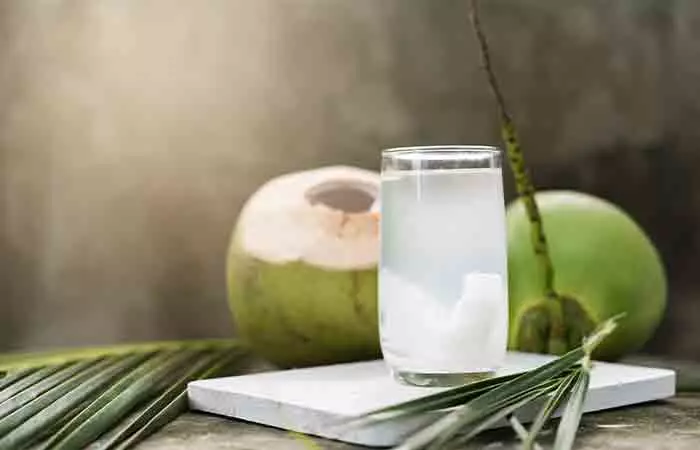
Coconut water contains crucial electrolytes that help in maintaining hydration. People involved in easy workouts and other strenuous activities should include as much coconut water as they can in their diet. Coconut water replaces the lost electrolytes, provides hydration and increases immune response (15). It is a better alternative to water as it is tastier than plain water and is loaded with nutrition.
Coconut has long been known for its diuretic effects. Intake of coconut water may also increase the levels of urinary potassium, chloride, and citrate (15). Drinking coconut water may possibly help get rid of the extra water and salts present in the body.
11. Nutritious And Healthy
Coconut water is considered to be more nutritious and healthier than whole milk. It contains lauric acid which is considered equivalent to mother’s milk (16). It is naturally sterile as it permeates through the filtering husk. It also helps with hangovers (17). Coconut water is also a natural isotonic beverage with the same concentration as body fluids (18).
12. Prevents Urinary Tract Infection
Coconut water is diuretic in nature (15). Anecdotal evidence suggests this may help treat urinary tract infections by improving the urine flow. This may help you get rid of the infection naturally.
13. Improves Blood Cholesterol
Coconut helps to improve blood cholesterol levels in the body and lowers the risk of heart diseases. The saturated fats in coconut raise the good cholesterol in the body and control the LDL to a benign subtype. This improvement in cardiovascular risk factors theoretically leads to reducing the risk of developing heart diseases (19).
14. Controls Acidity And Heartburn
Anecdotal evidence suggests coconut water can also help to alleviate acidity and heartburn problems. It may also help with diarrhea and gastroenteritis (20).
15. Extremely Beneficial During Pregnancy

Coconut water is sterile and is very good for pregnant ladies. Anecdotal evidence suggests it may improve the immunity and health of the mother and baby and prevent infection and other diseases. It also boosts the levels of amniotic fluid to improve the overall health of the fetus (21).
16. Fights Bacteria
Coconut contains high content of monolaurin and lauric acid which helps to kill bacteria, viruses and fungi and keeps infections at bay (22).
17. Good For Oral Hygiene
Coconut water can also be used as an out rinse to kill mouth bacteria, reduce bad breath and improve the overall dental health (23).
18. Healthy Bones And Teeth
Eating coconuts regularly supports the development of healthy bones and teeth. It improves the body’s ability to absorb calcium and manganese which aid bone development. It also prevents osteoporosis, a condition that makes the bones thin and fragile and loses its density (24). Thus it is a healthy alternative for those who are lactose intolerant.
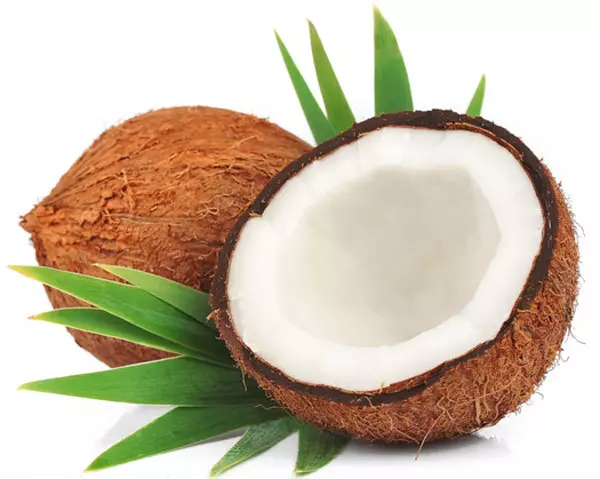
Skin Benefits Of Coconut
Coconut is often used in the form of oil in the cosmetic industry to improve the health and appearance of the skin and hair. Furthermore, there are many more benefits of coconut water for the skin. Explore the various ways in which this ingredient can improve your overall skin health in this section.
19. Fights Dryness
Coconut oil, if used on skin prevents dryness and flakiness and keeps it moisturized and supple
. It also supports the skin and works to repair the damage it has acquired over time. (25). Anecdotal evidence suggests that it eases a common skin condition called neurodermatitis, which is characterized by dry, rough, and flaky skin. It also reduces the severity of atopic dermatitis which is prone to infections like Staphylococcus aureusi A type of bacterium that can result in cellulitis, abscesses (boils), and other soft tissue illnesses. (26).
The use of coconut cleanses and neutralizes the toxins, fungi and bacteria on the outer layers of the skin which not only detoxifies but also builds the skin’s natural immune system and protection.
20. Effective On Dry Hands
Extra virgin coconut oil can also be used to treat dry and parched hands. Regular dishwashing often dries out the skin and makes them unsightly. Instead of using expensive chemical-laden cosmetics, apply virgin coconut oil on the hands to get beautiful and smooth hands. Even to treat cracked and brittle nails, coconut oil is used for its moisturizing properties (27).
21. Prevents Skin Cancer
It improves the moisture and lipid content in the skin and may prevent skin cancer by providing moderate protection from ultraviolet rays (27).. It can be used as a body and skin moisturizer as it hydrates the skin by replenishing the natural oils. Coconut oil can also be used to clean the face by rubbing it in circular motions.
22. May Keep The Skin Youthful
Coconut oil is excellent for keeping the skin young and beautiful. Its antioxidant property slows down the aging process by protecting the body from harmful free radicals (28). Massaging a few drops of coconut oil daily will keep it healthy and smooth. Apply it onto the skin before showering. This will open the pores while showering and will allow the oil to absorb through the skin more efficiently.
23. Cleans The Skin
You may also use coconut oil as a cleanser. Take a teaspoon of raw, uncooked coconut oil and massage the skin with it. Wipe with a cotton cloth and use your regular face wash. This will minimize the outbreaks of skin, rashes, and irritations.
24. Promotes Blood Circulation
Anecdotal evidence suggests eating coconut regularly boosts oxygen in the skin and promotes blood circulation. Our cells need an adequate amount of oxygen which can only be made possible by proper circulation in the body that carries oxygen. This allows proper breathing of the skin and promotes healthy and flawless complexion.
25. Reverses Effects Of Tanning
Anecdotal evidence suggests eating coconut water may also help to reverse tanning. Mix Fuller’s earth with coconut water and apply it all over the skin. Leave it for 20 minutes and then wash it off with cold water. Apply this face pack twice weekly to get tan-free skin.
26. Treats Oily Skin
Coconut water may also be used to treat oily skin. Anecdote evidence suggests it washes away excess oil from the skin and keeps the skin tone more even. It may also be effective on acne, black spots, and blemishes. Make a face pack by mixing half a teaspoon of turmeric, 1 teaspoon of sandalwood powder and coconut water. Apply it on the face thrice weekly to get clear and glowing skin.
27. Removes Eye Makeup
Coconut oil can also be used to remove eye makeup. Put a few drops of coconut oil on a cotton ball and wipe your eyes with it. It effectively removes the tough eye makeup by breaking down the ingredients in the eye makeup. It keeps the skin hydrated too.
28. Body Scrub
Coconut can also be used as a body scrub. Mix some coconut oil and a cup of brown sugar and stir well. Finally, scrape some coconut shell, add a few drops of essential oil and mix it. Your scrub is ready to use. You can also mix 1 tablespoon of coconut water and lentils to make a paste. Rub it gently on the face for 2 minutes and then wash off.
 Fun Fact
Fun FactHair Benefits Of Coconut
Coconut for hair helps to treat hair loss problems (29). Both coconut water and coconut oil can help to treat hair fall. Massage your hair with coconut water or coconut oil prior to bathing to manage unruly hair and prevent hair breakage. This will also make the hair soft, smooth and manageable.
29. Prevents Scalp Infections
The antibacterial and antifungal properties of coconut protect the scalp from dandruff, lice and itchy scalp which often slows down the hair growth (29).
30. Helps Maintain Healthy Hair
Coconut can also help you to get shiny and silky hair.
The Vitamin K and iron content in coconut maintain the health of the hair and impart shine to it. You can use plain coconut milk for the hair or combine it with other nutritious ingredients to create a nourishing mask for healthy, shiny, luscious hair.
Both coconut oil and milk are beneficial for your health. However, which one is better in terms of properties and usage? Find out below.
Coconut Oil Vs. Coconut Milk
Coconut oil and coconut milk have unique characteristics and serve distinct purposes. While coconut oil is a fatty oil extracted from the mature coconut flesh, coconut milk is a mixture of coconut water and flesh. Coconut oil primarily comprises saturated fats, particularly lauric acid, which possesses antimicrobial properties (30). Coconut milk, a staple in many Southeast Asian dishes, has a rich content of healthy fats, proteins, and certain minerals.
Coconut oil is used for baking, cooking, frying, and sautéing due to its high smoke point and healthier nutrient content. Whereas coconut milk is used in curries, soups, stews, and various Asian dishes to add flavor and enhance texture. Both can be part of a balanced diet, provided they are consumed in moderation. Apart from these forms, fresh or dried coconut flesh can also be consumed as a snack for a boost of wholesome nutrition during the day. The following section demonstrates the nutritional content of coconut. Check it out!
Coconut Nutritional Value
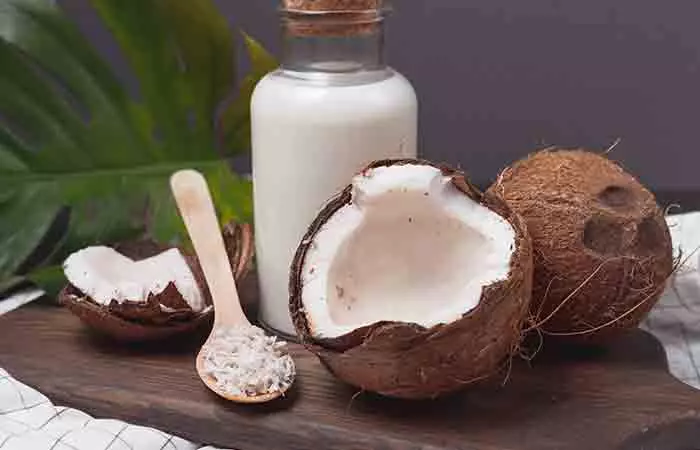
| Principle | Nutrient Value | Percentage of RDA |
|---|---|---|
| Energy | 354 Kcal | 18% |
| Carbohydrates | 15.23 g | 12% |
| Protein | 3.3 g | 6% |
| Total Fat | 33.49 g | 167% |
| Cholesterol | 0 mg | 0% |
| Dietary Fiber | 9 g | 24% |
| Vitamins | ||
| Folates | 26 µg | 6.5% |
| Niacin | 0.540 mg | 3% |
| Pantothenic acid | 0.300 mg | 6% |
| Pyridoxine | 0.054 mg | 4% |
| Riboflavin | 0.020 mg | 1.5% |
| Thiamin | 0.066 mg | 5.5% |
| Vitamin C | 3.3 mg | 5.5% |
| Vitamin A | 0 IU | 0% |
| Vitamin E | 0.24 mg | 2% |
| Vitamin K | 0.2 µg | |
| Electrolytes | ||
| Sodium | 20 mg | 1% |
| Potassium | 356 mg | 7.5% |
| Minerals | ||
| Calcium | 14 mg | 1.4% |
| Copper | 0.435 mg | 48% |
| Iron | 2.43 mg | 30% |
| Magnesium | 32 mg | 8% |
| Manganese | 1.500 mg | 65% |
| Phosphorus | 113 mg | 16% |
| Selenium | 10.1 µg | 18% |
| Zinc | 1.10 mg | 10% |
| Phyto-nutrients | ||
| Carotene, beta | 0 µg | — |
| Phytosterols | 47 mg | — |
These coconut nutrition facts give you an insight into how healthy it is. Coconut is rich in calories, vitamins and plenty of minerals. An average 400 grams of coconut flesh provides almost all the vitamins and minerals required by the body for a day. 100 grams of coconut kernels contain around 350 calories. Wondering how many calories in a coconut? There are 350 calories in coconut kernels weighing 100 grams. It contains high saturated acids like lauric acid and bioactive compounds that are essential for better health. The kernel is an excellent source of copper, calcium, manganese, magnesium and zinc. It is also a good source of folates, niacin, thiamine and pyridoxine. The fruit is also a good source of potassium.
Coconut water is very refreshing and contains simple sugars, electrolytes, minerals, acid phosphatase, catalase, dehydrogenase, peroxidase and polymerases. Not just the water, its oil is also classified as a superfood. Its unique combination of fatty acids can have profound effects on your health.
However, note that anything in excess can be detrimental to your health. Check out the next section to learn about the downsides to consuming excess coconut.
Side Effects Of Coconut
Overconsumption of coconut may cause some health issues, like:
- It may cause weight gain as coconut is a high-calorie food.
- It is high in saturated fats and excess consumption may cause a rise in cholesterol levels.
- Coconut sap contains fructose, glucose, and sucrose at 3.48%, 2.53%, and 6.91%, respectively (31). The high sugar content may affect blood glucose levels if consumed in excess.
- It may cause allergic reactions like itching and rashes in people allergic to tree nuts.
Therefore, it is best to consume it in moderation and also consult your doctor before including coconut in your daily routine. Your doctor will help you determine the recommended quantity of coconut you can consume based on your existing health conditions.
Khushbu, a blogger, shares in her blog how coconut oil did not provide the positive results she was expecting. She states, “I experienced awful breakouts, especially in the form of tiny flesh-coloured bumps, across my jawline and chin along with highly inflamed & unpleasant red spots (i).” She had to eventually stop using it after three weeks, which goes on to show it may not be for everyone.
Infographic: Interesting Facts About Coconut
Each part of the coconut tree, from the roots to the husk, has its own uses and benefits. Coconut offers many medicinal properties that help treat several ailments. It is popular for its potential health benefits and culinary applications and is available in more than 150 varieties around the globe. Click on the infographic below to learn some interesting facts about coconut.
Some thing wrong with infographic shortcode. please verify shortcode syntax
Coconut is a rich tropical fruit with many culinary applications. It also has a diverse nutritional profile comprising fatty acids. These nutrients help aid weight loss and manage diabetes. Coconut may also help control acidity, promote oral health, and reduce the risk of seizures. This natural antibacterial moisturizer is useful for hair and skin health and wellness too. However, excess use can lead to side effects. If you experience any, limit its use and seek medical advice.
Frequently Asked Questions
How much coconut should I eat a day?
Eating 1.3 cups (100 g) of fresh coconut daily may support weight loss and reduce blood glucose levels (32). Feder says, “In moderation, coconut is a great addition to one’s daily diet. However, it is important to note that for those prone to high cholesterol, I recommend limiting your intake of coconut due to its high saturated fat content. The saturated fat in coconut can raise your LDLi or bad cholesterol levels.”
Does coconut cause bloating?
Feder says, “Coconut can cause bloating, especially if you are sensitive to high fat and fiber intake. Coconut is naturally high in saturated fat and fiber which can be hard on the digestive tract if eaten in excess. The fiber takes time to digest so the coconut will sit in your stomach for longer periods of time compared to lower-fiber foods. This can contribute to belly bloating. Additionally, the high-fat content in the coconut can cause inflammation in some individuals which will also cause bloating.”
Does coconut make you sleepy?
According to Feder, “Coconut does contain a significant amount of magnesium and potassium which are known to help relax muscles. This can help make you feel relaxed overall at night and sleepy. However, during the day you most likely will not get sleepy from eating coconut or drinking coconut water.”
Is eating coconut good at night?
No scientific evidence supports the benefits of consuming coconut at night. However, coconut contains fiber and healthy fats. Eating coconut may help burn extra fat from the body, help keep your heart healthy, and improve good cholesterol levels in the body.
How much coconut should I eat a day?
Eating 1.3 cups (100 g) of fresh coconut daily may support weight loss and reduce blood glucose levels (32).
What is the best time to eat coconut?
It depends on your preferences. You may consume fresh coconut during the daytime or a piece of dry coconut at night. You can also enjoy dry coconut benefits and its taste, as it is a good substitute for fresh coconut.
Illustration: Incredible Benefits Of Coconut And Its Nutritional Value
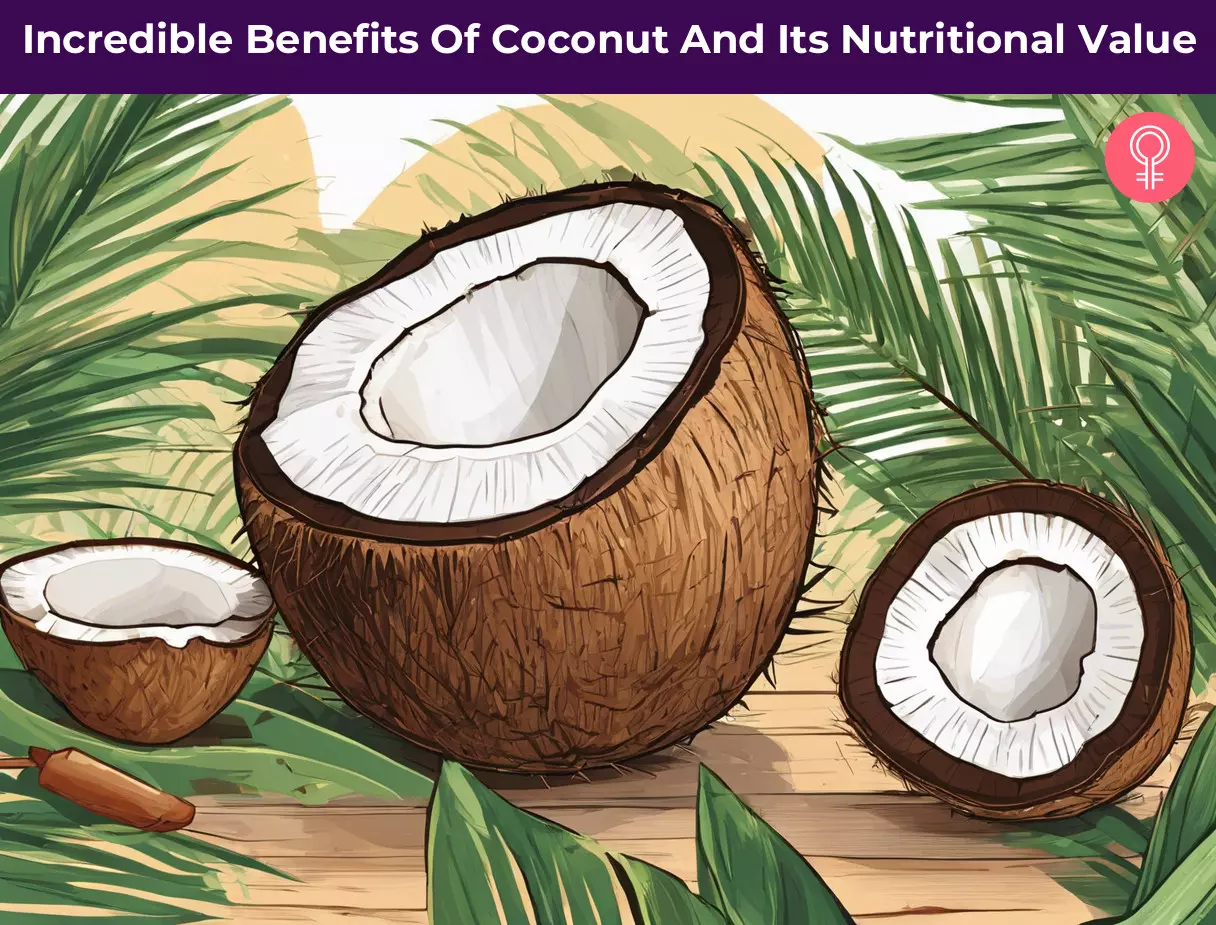
Image: Stable Diffusion/StyleCraze Design Team
Coconuts are a super fruit, making them a great source of nutrition and many health benefits. Watch this video to learn how to use them to improve your health!
Personal Experience: Source
StyleCraze's articles are interwoven with authentic personal narratives that provide depth and resonance to our content. Below are the sources of the personal accounts referenced in this article.
i. My experience with applying coconut oil on my facehttps://kthadani.com/2016/06/20/my-experience-with-applying-coconut-oil-on-my-face/
References
Articles on StyleCraze are backed by verified information from peer-reviewed and academic research papers, reputed organizations, research institutions, and medical associations to ensure accuracy and relevance. Read our editorial policy to learn more.
- Long-term consumption of virgin coconut (Cocos nucifera) oil diet impairs learning and memory in CD1 mice
https://www.ncbi.nlm.nih.gov/pmc/articles/PMC9476473/ - A concise review on oil extraction methods, nutritional and therapeutic role of coconut products
https://www.ncbi.nlm.nih.gov/pmc/articles/PMC9873890/ - Effects of Dietary Fiber and Its Components on Metabolic Health
https://www.ncbi.nlm.nih.gov/pmc/articles/PMC3257631/ - Coconut products alleviate hyperglycaemic, hyperlipidimic and nephropathy indices in streptozotocin-induced diabetic wistar rats
https://www.ncbi.nlm.nih.gov/pmc/articles/PMC8324991/ - Coconut Palm: Food, Feed, and Nutraceutical Properties
https://www.ncbi.nlm.nih.gov/pmc/articles/PMC9405385/ - Contemporary Developments and Emerging Trends in the Application of Spectroscopy Techniques: A Particular Reference to Coconut (Cocos nucifera L.)
https://www.ncbi.nlm.nih.gov/pmc/articles/PMC9147692/ - Coconut (Cocos nucifera L.: Arecaceae): in health promotion and disease prevention
https://pubmed.ncbi.nlm.nih.gov/21771462/ - Coconut Oil and Immunity: What do we really know about it so far?
https://pubmed.ncbi.nlm.nih.gov/32602684/ - Abdominal Obesity, Adipokines and Non-communicable Diseases
https://www.ncbi.nlm.nih.gov/pmc/articles/PMC7431389/ - The effect of coconut oil on anthropometric measurements and irisin levels in overweight individuals
https://www.ncbi.nlm.nih.gov/pmc/articles/PMC9247948/ - Coconut oil and medium-chain fatty acids attenuate high-fat diet-induced obesity in mice through increased thermogenesis by activating brown adipose tissue
https://www.ncbi.nlm.nih.gov/pmc/articles/PMC9650104/ - Influence of dietary fat on factors in serum that regulate thyroid cell metabolism
https://pubmed.ncbi.nlm.nih.gov/2172489/ - The Metabolic Role of Ketogenic Diets in Treating Epilepsy
https://www.ncbi.nlm.nih.gov/pmc/articles/PMC9738161/ - In Vitro Anticancer Activity of Virgin Coconut Oil and its Fractions in Liver and Oral Cancer Cells
https://pubmed.ncbi.nlm.nih.gov/31736449/ - Coconut Water: An Unexpected Source of Urinary Citrate
https://www.ncbi.nlm.nih.gov/pmc/articles/PMC6236775/ - Saturated Fats: A Perspective from Lactation and Milk Composition
https://www.ncbi.nlm.nih.gov/pmc/articles/PMC2950926/ - Detoxification activity of bioactive food compounds against ethanol‐induced injuries and hangover symptoms: A review
https://www.ncbi.nlm.nih.gov/pmc/articles/PMC2950926/
- Carbohydrate-Electrolyte Characteristics of Coconut Water from Different Varieties and Its Potential as Natural Isotonic Drink
https://www.researchgate.net/publication/289490512_Carbohydrate-Electrolyte_Characteristics_of_Coconut_Water_from_Different_Varieties_and_Its_Potential_as_Natural_Isotonic_Drink - Coconut Oil and Cardiovascular Disease Risk
https://www.ncbi.nlm.nih.gov/pmc/articles/PMC10182109/ - Use of coconut water (Cocus nucifera L) for the development of a symbiotic functional drink
https://www.ncbi.nlm.nih.gov/pmc/articles/PMC7110305/ - Liquid Endosperm of Coconut Consumed Orally Increases Amniotic Fluid in Oligohydramnios
https://journals.lww.com/greenjournal/citation/2005/04001/liquid_endosperm_of_coconut_consumed_orally.79.aspx - Coconut oil and palm oil’s role in nutrition, health and national development: A review
https://www.ncbi.nlm.nih.gov/pmc/articles/PMC5044790/ - Effect of coconut oil in plaque related gingivitis — A preliminary report
https://www.ncbi.nlm.nih.gov/pmc/articles/PMC4382606/ - Virgin Coconut Oil Supplementation Prevents Bone Loss in Osteoporosis Rat Model
https://www.ncbi.nlm.nih.gov/pmc/articles/PMC3457741/ - Anti-Inflammatory and Skin Barrier Repair Effects of Topical Application of Some Plant Oils
https://www.ncbi.nlm.nih.gov/pmc/articles/PMC5796020/ - Prospective Randomized Double-Blind Vehicle-Controlled Study of Topical Coconut and Sunflower Seed Oil-Derived Isosorbide Diesters on Atopic Dermatitis
https://pubmed.ncbi.nlm.nih.gov/38394048/ - In vitro anti-inflammatory and skin protective properties of Virgin coconut oil
https://www.ncbi.nlm.nih.gov/pmc/articles/PMC6335493/ - Anti-Aging Effects of a Serum Based on Coconut Oil Combined with Deer Antler Stem Cell Extract on a Mouse Model of Skin Aging
https://www.ncbi.nlm.nih.gov/pmc/articles/PMC8870445/ - Clinical Study to Evaluate the Efficacy and Safety of a Hair Serum Product in Healthy Adult Male and Female Volunteers with Hair Fall
https://www.ncbi.nlm.nih.gov/pmc/articles/PMC7522433/ - Antimicrobial Properties of Lauric Acid and Monolaurin in Virgin Coconut Oil: A Review
https://www.researchgate.net/publication/361417965_Antimicrobial_Properties_of_Lauric_Acid_and_Monolaurin_in_Virgin_Coconut_Oil_A_Review - Coconut (Cocos nucifera L.) sap as a potential source of sugar: Antioxidant and nutritional properties
https://www.ncbi.nlm.nih.gov/pmc/articles/PMC7174220/ - Diet enriched with fresh coconut decreases blood glucose levels and body weight in normal adults
https://www.researchgate.net/publication/323318586_Diet_enriched_with_fresh_coconut_decreases_blood_glucose_levels_and_body_weight_in_normal_adults
Read full bio of Dr. Zeel Gandhi
- Jesse Feder, RDN/LDN, is a Clinical Dietitian at the Memorial Regional Hospital. He is also a certified by the American College of Sports Medicine as a personal trainer (ACSM-CPT) and the National Strength and Conditioning Association as a Certified Strength and Conditioning Specialist (NSCA-CSCS).
 Jesse Feder, RDN/LDN, is a Clinical Dietitian at the Memorial Regional Hospital. He is also a certified by the American College of Sports Medicine as a personal trainer (ACSM-CPT) and the National Strength and Conditioning Association as a Certified Strength and Conditioning Specialist (NSCA-CSCS).
Jesse Feder, RDN/LDN, is a Clinical Dietitian at the Memorial Regional Hospital. He is also a certified by the American College of Sports Medicine as a personal trainer (ACSM-CPT) and the National Strength and Conditioning Association as a Certified Strength and Conditioning Specialist (NSCA-CSCS).
Read full bio of Tanya Choudhary
Read full bio of Ravi Teja Tadimalla
Read full bio of Moksha Gandhi




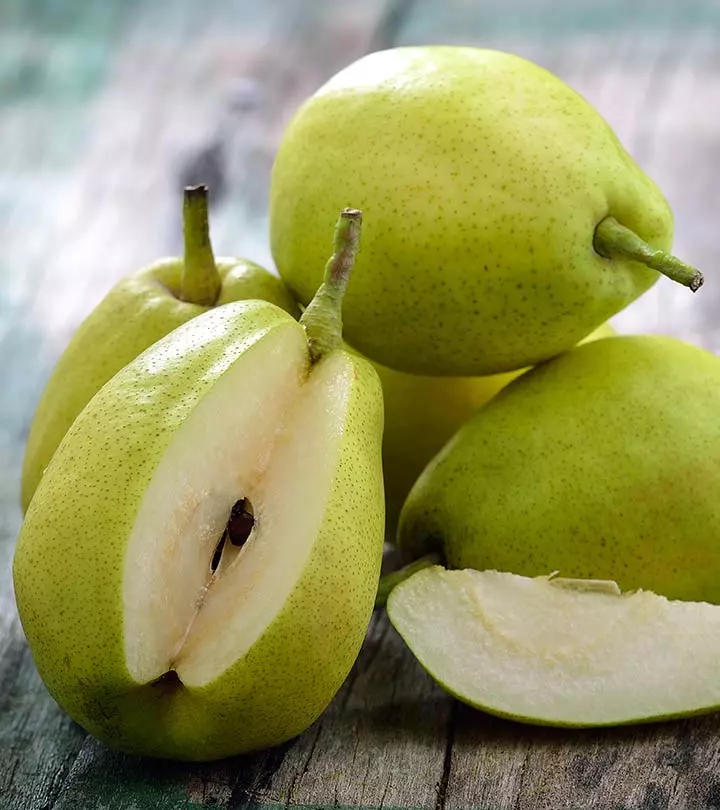

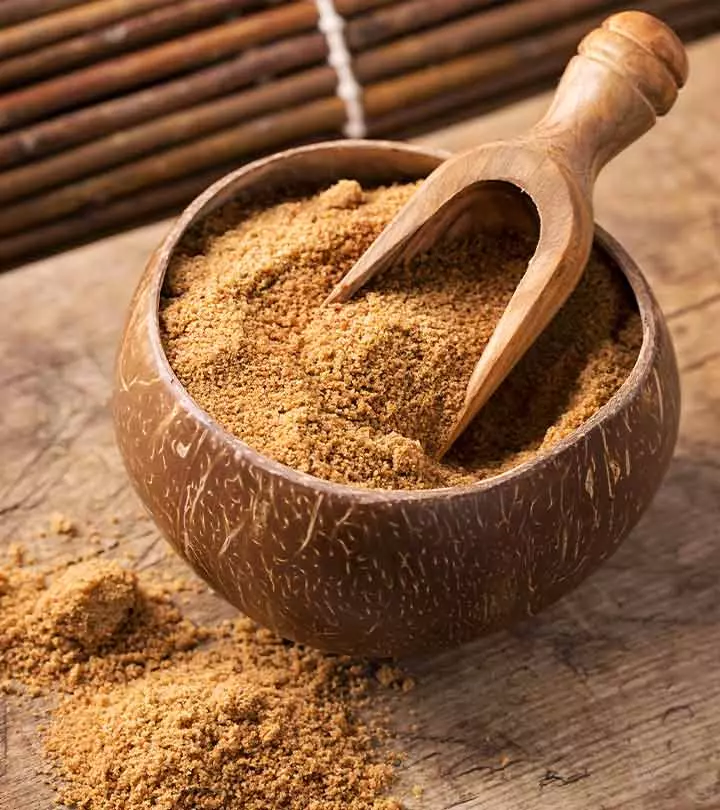

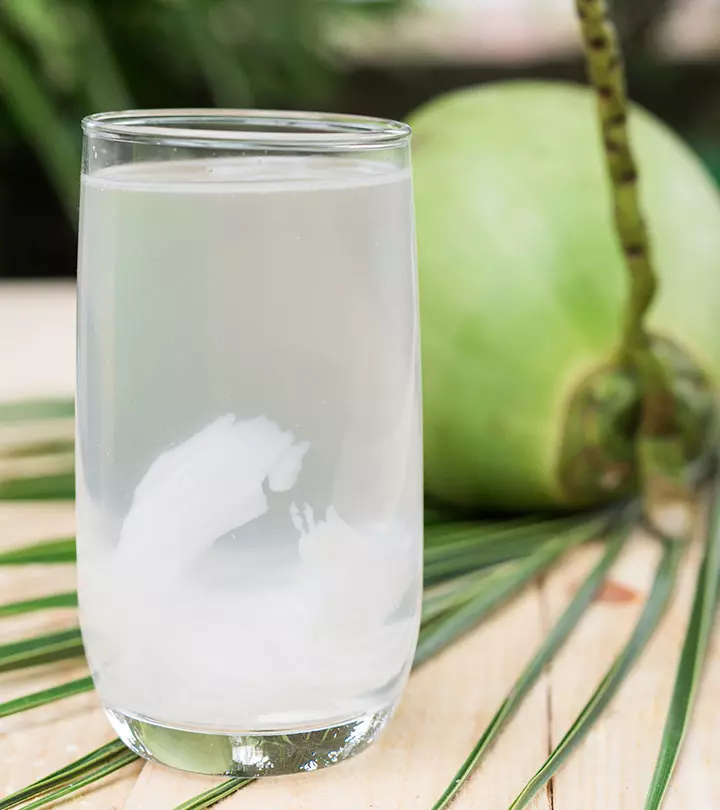
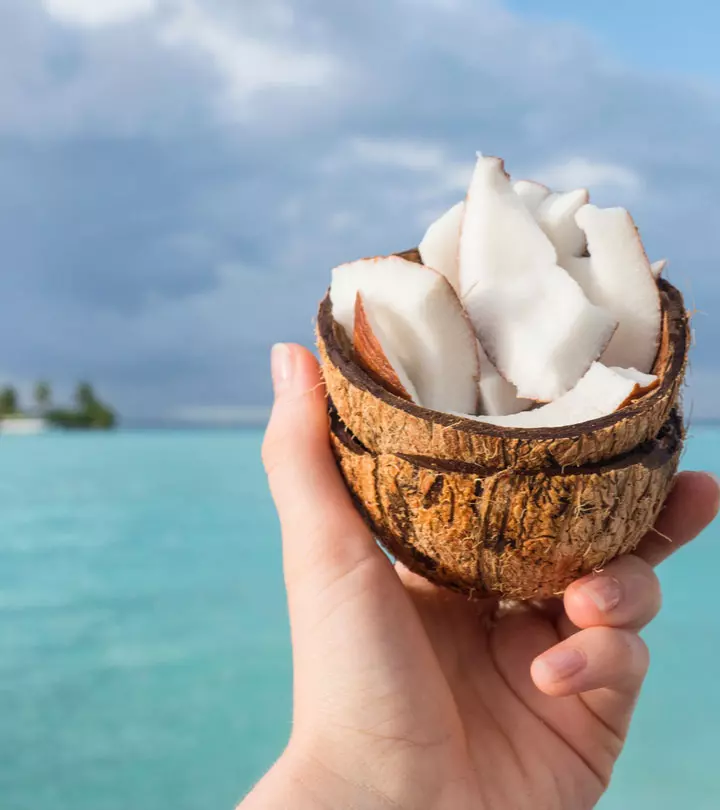


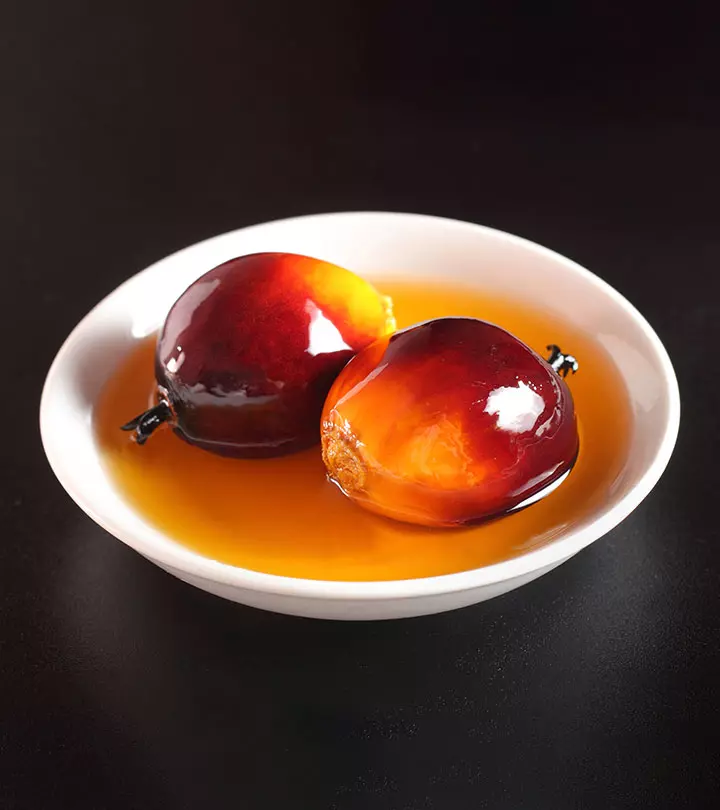
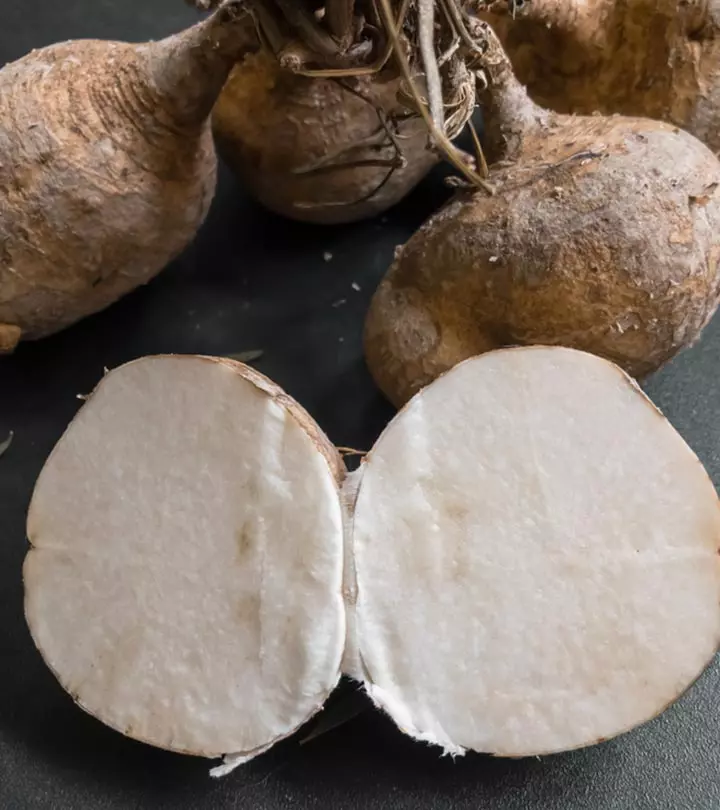
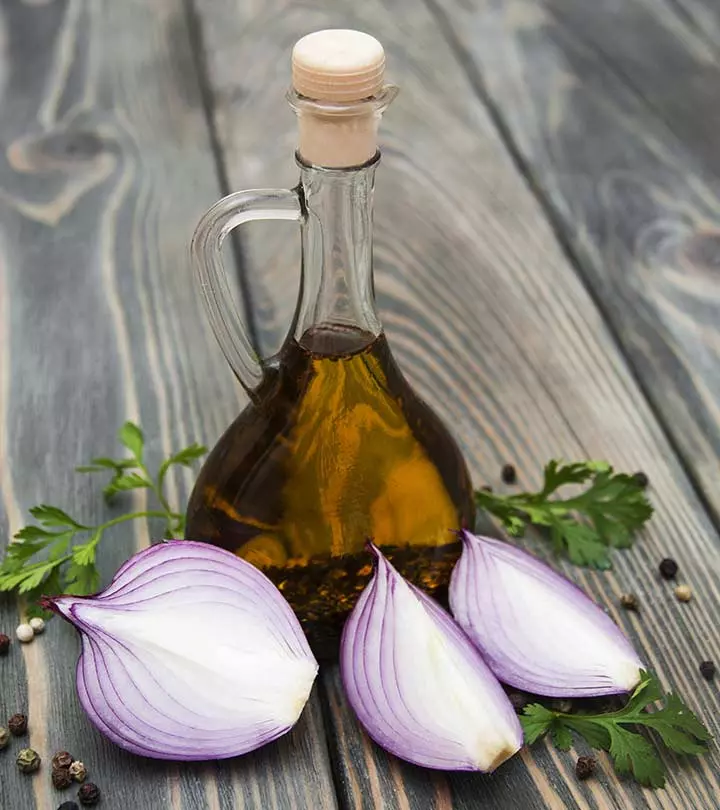
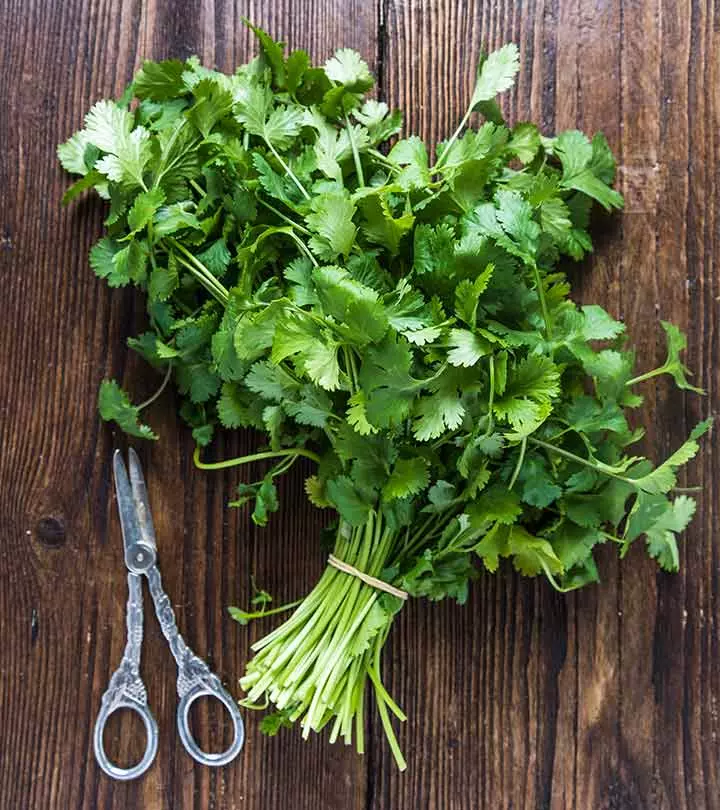


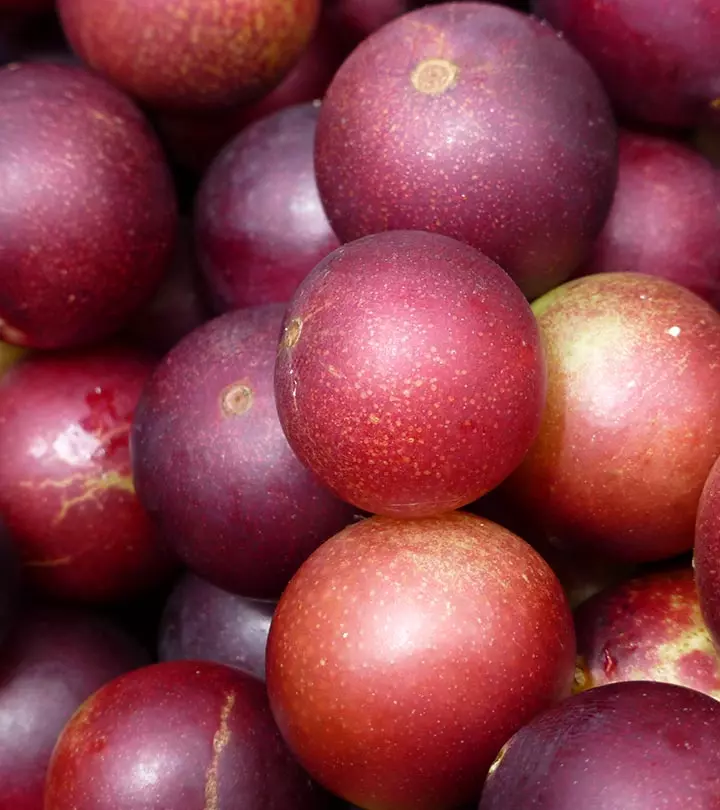
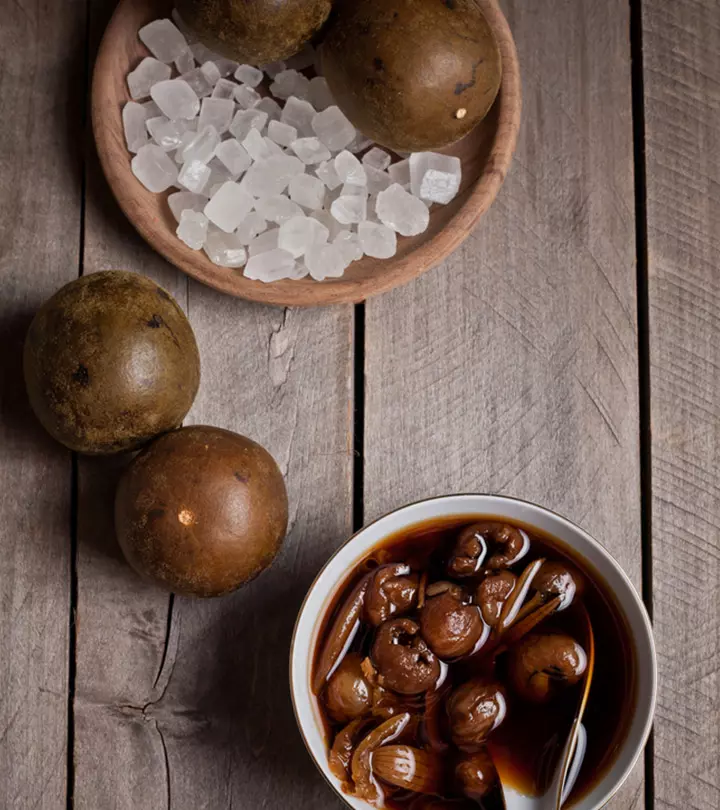
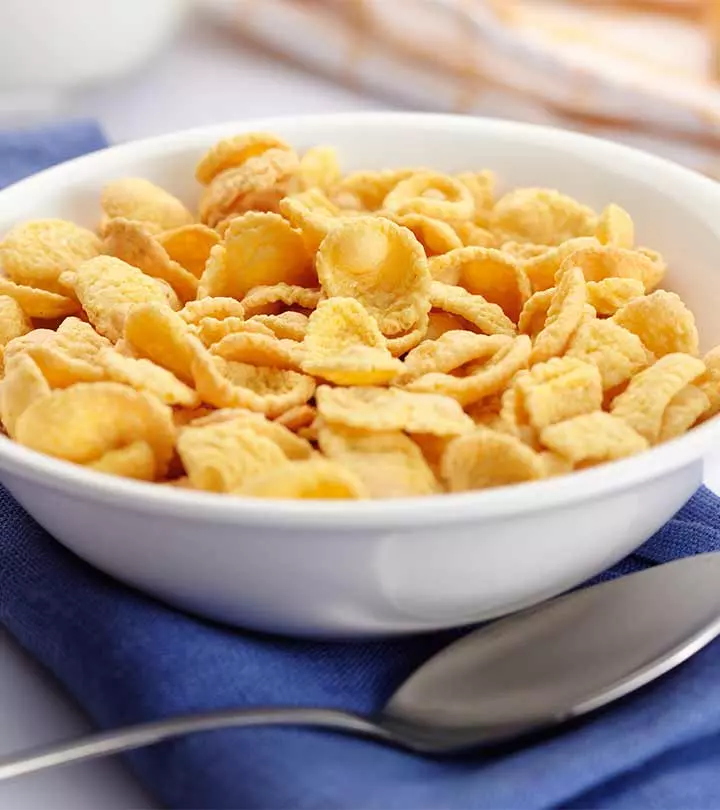
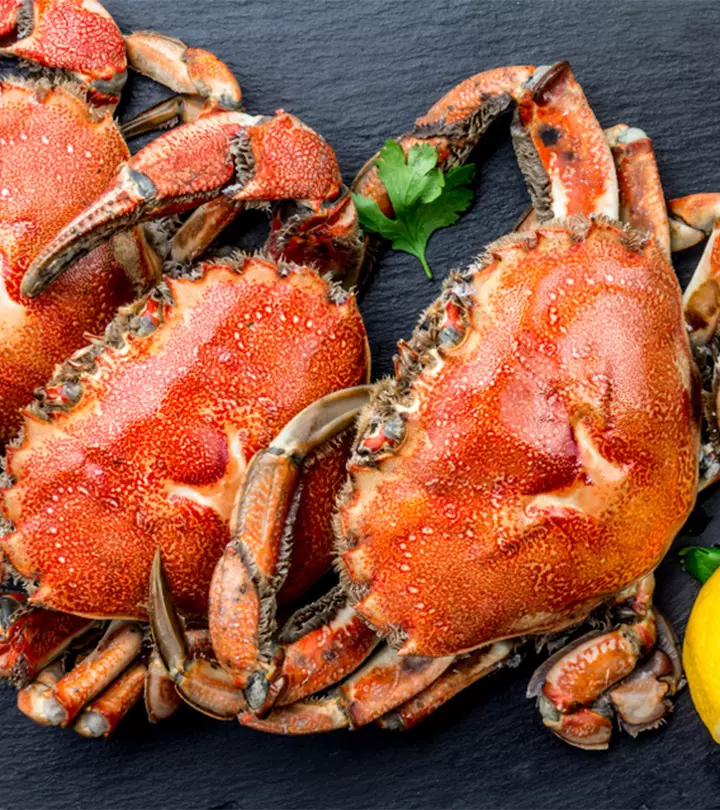

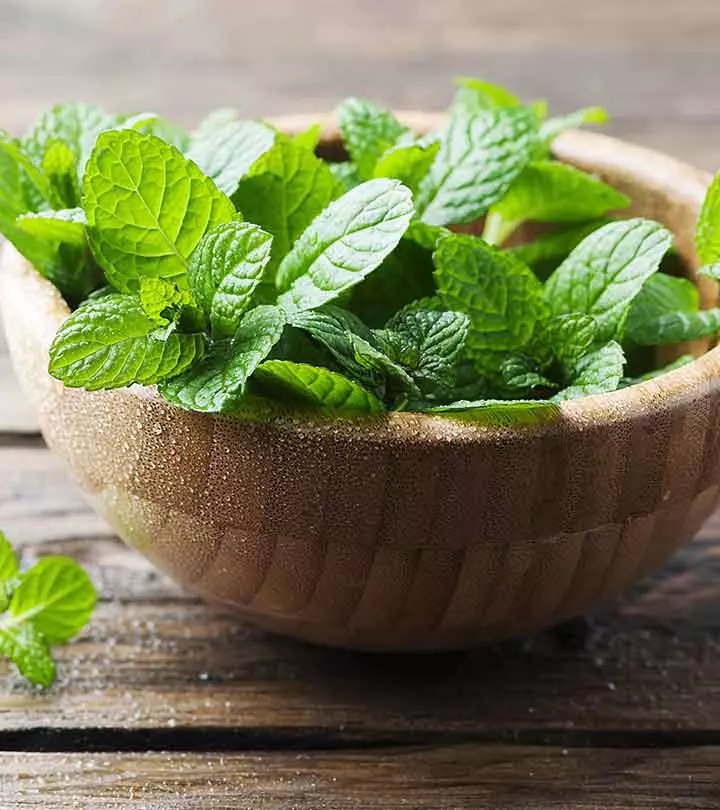


Community Experiences
Join the conversation and become a part of our empowering community! Share your stories, experiences, and insights to connect with other beauty, lifestyle, and health enthusiasts.